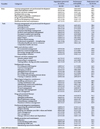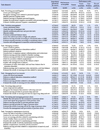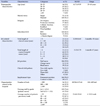Abstract
Purpose
The purpose of this study was to identify the importance, performance and rates of nurses' performance of nursing interventions in long-term care hospitals.
Methods
A cross-sectional descriptive study was used and data were collected in 2015. Participants were 174 clinical nurses working in 14 long-term care hospitals. The collected data were analyzed using the SPSS/WIN 18.0.
Results
The nurses' perceived importance of nursing interventions was 4.48±0.51, and the degree of nursing intervention performance in long-term care hospitals was 3.97±1.07 out of 5. The rates of nursing interventions performed by nurses ranged from 33.9% to 99.4% with an average of 82.5%. There were statistically significant positive correlations among perceived importance, performance in hospitals, and rates for nurses' performance of nursing interventions (p<.001).
Conclusion
The results indicate that interventions with a high degree of importance and performance could be the core nursing interventions in long-term care hospitals. These core nursing interventions should be included in education for nurses. These findings can be used in developing realistic guidelines and effective strategies for nurses and administrators to improve the quality of nursing and the status of nursing professionals in long-term care hospitals.
Figures and Tables
Table 2
Importance, Performance, and Nurses' Performance Rates for 8 Duties and 47 Tasks of Nursing Intervention (N=174)

Table 3
Importance, Performance, and Nurses' Performance Rates of Nursing Interventions in Fundamentals Nursing (N=174)

References
1. Statistics Korea. Sex ratio by family, population growth rate, population structure, support ratio, aging index, median age, average age (nationwide) (population item) (1960~2060) [Internet]. Statistics Korea;updated February 23, 2012. cited May 11, 2015. Available from: http://kosis.kr/statHtml/statHtml.do?orgId=101&tblId=DT_1B35001&conn_path=I3.
2. Ministry for Health and Welfare (KR). Enforcement Rule of the Medical Service Act. Ordinance of the Ministry of Health and Welfare;2015. 05. 29. No. 317.
3. Statistics Korea. Status of medical institutions by type of city, county, and district (2013~2015 1/4) [Internet]. Statistics Korea;cited May 11, 2015. Available from: http://kosis.kr/statHtml/statHtml.do?orgId=354&tblId=DT_HIRA4B&conn_path=I3.
4. Kim D, Lee HJ. Effects on long-term care hospital staff mixing level after implementing differentiated inpatient nursing fees by staffing grades. J Korean Acad Nurs Adm. 2014; 20(1):95–105. DOI: 10.11111/jkana.2014.20.1.95.
5. Statistics Korea. Classification of human resources II (Nurses and Other Personnel) (2003.01~2015 2/4) [Internet]. Statistics Korea;cited May 17, 2015. Available from: http://kosis.kr/statHtml/statHtml.do?orgId=354&tblId=DT_HIRA4A&conn_path=I3.
6. Statistics Korea. Classification of human resources I (Doctor, pharmacist, etc.) (2003.01~2015.2/4) [Internet]. Statistics Korea;cited October 29, 2015. Available from: http://kosis.kr/statHtml/statHtml.do?orgId=354&tblId=DT_HIRA44&conn_path=I2.
7. Kim Y, Lee JY, Kang HC. Impact of nurse, nurses' aid staffing and turnover rate on inpatient health outcomes in long term care hospitals. J Korean Acad Nurs. 2014; 44(1):21–30. DOI: 10.4040/jkan.2014.44.1.21.
8. Park JH. The effect of nurse staffing on patient outcomes in long-term care hospitals [dissertation]. Seoul: Ewha Womans University;2013.
9. Lee JH, Lee GE. Perception and practice of hospital infection control of nursing staff depending on the supplementation of nurses in long-term care hospitals. Korean J Occup Health Nurs. 2012; 21(3):308–316. DOI: 10.5807/kjohn.2012.21.3.308.
10. Kim EH, Lee EJ. Nursing outcomes of inpatient on level of nursing staffing in long term care hospitals. J Korean Data Inf Sci Soc. 2015; 26(3):715–727. DOI: 10.7465/jkdi.2015.26.3.715.
11. Health Insurance Review & Assessment Service. 2013 (5th) Evaluation result of appropriateness of long-term care hospital. Wonju: Health Insurance Review & Assessment Service;2014.
12. Kim MH, Jeong CY. A survey of the nursing activities performed by nursing staffs in long-term care hospitals. J Korea Acad Ind Coop Soc. 2014; 15(2):940–951. DOI: 10.5762/KAIS.2014.15.2.940.
13. Lim HY. Nursing activities and delegation in long-term care settings [master's thesis]. Busan: Pusan National University;2015.
14. Park SE. Nursing activities and delegation status of registered nurses in geriatric hospital [master's thesis]. Daejeon: Chungnam National University;2011.
15. Sung YH, Shin HY. Analysis of the core nursing interventions used in the medical and surgical units in a tertiary hospital. Korean J Adult Nurs. 2006; 18(4):632–641.
16. Park IS, Kang SY, Go IS, Park IH, Park HS, Seo YO, et al. Nurses secondary job analysis study report. Seoul: National Health Personnel Licensing Examination Board;2012.
17. Lee ER, Kwak MK, Kim EJ, Kwon IG, Hwang MS. Job analysis of korean oncology advanced practice nurses in clinical workplace: Using the DACUM method. J Korean Oncol Nurs. 2010; 10(1):68–79.
18. Hwang MS, Lee SJ, Lim NY, Lee MK. Job descriptions of hospital based home care nurse practitioners in Korea by DACUM technique. J Korean Acad Soc Home Care Nurs. 2011; 18(1):48–57.
19. Park HT, Kim YA, Hwang HY. The importance and performance of nursing interventions perceived by nurses in long-term care facilities for elderly. J Korean Acad Nurs Adm. 2006; 12(2):189–195.
20. Faul F, Erdfelder E, Buchner A, Lang AG. Statistical power analyses using G*Power 3.1: tests for correlation and regression analyses. Behavior Research Methods. 2009; 41(4):1149–1160. DOI: 10.3758/brm.41.4.1149.
21. Lim NY, Yun SN, Kim JE, Lee YS, Jung YY, Song JH. Frequency and importance of nurse's job in new graduate nurses working in musculoskeletal ward. J Muscle Joint Health. 2006; 13(2):108–118.
22. Song JH, Moon MJ. Frequency and importance of nursing practice between novice nurses and student nurses. J Korean Acad Fundam Nurs. 2008; 15(1):22–33.
23. Back SH, Kim KH. Comparison of job performance and job satisfaction of nurse assistants in heneral hospitals and longterm care hospitals. Health Serv Manage Rev. 2014; 8(1):1–10.
24. Plawecki LH, Amrhein DW. A question of delegation: Unlicensed assistive personnel and the professional nurse. J Korean Gerontol Nurs. 2010; 36(8):18–21. DOI: 10.3928/00989134-20100712-01.
25. National Council of State Boards of Nursing. National guidelines for nursing delegation. J Nurs Regul. 2016; 7(1):5–14. DOI: 10.1016/S2155-8256(16)31035-3.
26. Corazzini KN, Anderson RA, Rapp CG, Mueller C, McConnell ES, Lekan D. Delegation in long-term care: Scope of practice or job description? Online J Issues Nurs. 2010; 15(2):DOI: 10.3912/OJIN.Vol15No02Man04.
27. National Health Insurance Service. 2016 Guide comprehensive nursing care service [Internet]. Wonju: National Health Insurance Service;updated September 1, 2016. cited April 05, 2017. Available from: http://www.nhis.or.kr/bbs7/boards/B0040/21012.
28. Kwon IG, Cho MS, Shin HY. The perceived importance and performance frequency of nursing interventions in the oncology units in a tertiary hospital. Korean J Adult Nurs. 2007; 19(2):260–273.
29. Choi EH, Seo JY. Comparison among with nursing records, nursing intervention priority perceived by nurse and nursing intervention frequency of general surgery department. Korean J Adult Nurs. 2009; 21(3):349–354.
30. Choi J. Perspectives on cost containment and quality of health care in the DRG payment system of Korea. J Korean Med Assoc. 2012; 55(8):706–709. DOI: 10.5124/jkma.2012.55.8.706.




 PDF
PDF ePub
ePub Citation
Citation Print
Print





 XML Download
XML Download